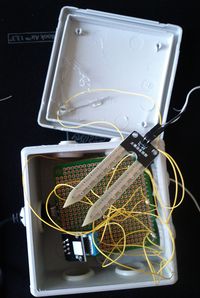AgriSensor : Arduino-Based Sensor for Agriculture
Jump to navigation
Jump to search
Hardware Requirement
- Arduino Nano
- Soil Humidity Moisture Detection Sensor
- DHT11/DHT21/DHT22 etc. Temperature & Humidity sensors
- Photocell
Extra weather sensors:
Arduino sketch
// Hardware requirement
// Soil http://dx.com/p/soil-humidity-moisture-detection-sensor-module-blue-black-white-200142
// DHT http://dx.com/p/arduino-digital-temperature-humidity-sensor-module-121350
// Photocell https://www.sparkfun.com/products/9088
// Extra sensors:
// http://air.imag.fr/index.php/SEN-08942
// http://dx.com/p/rain-raindrops-sensor-module-for-arduino-black-works-with-official-arduino-boards-228260
#include "DHT.h"
int SOIL_DIGITAL_PIN=2;
int SOIL_ANALOG_PIN=A0;
int LIGHT_ANALOG_PIN=A1;
int DHT_PIN=4;
#define DHT_TYPE DHT11 // DHT 11
//#define DHT_TYPE DHT22 // DHT 22 (AM2302)
//#define DHT_TYPE DHT21 // DHT 21 (AM2301)
// Connect middle pin of the sensor breadout to +5V
// Connect pin S of the sensor to whatever your DHTPIN is
// Connect pin - (on the right) of the sensor to GROUND
DHT dht(DHT_PIN, DHT_TYPE);
void setup() {
Serial.begin(9600);
pinMode(SOIL_DIGITAL_PIN, INPUT);
dht.begin();
}
void loop() {
Serial.print("/soil/humidity ");
Serial.print(map(analogRead(SOIL_ANALOG_PIN),200,1023,100,0));
// Serial.print("/soil/alert ");
// Serial.println(digitalRead(SOIL_DIGITAL_PIN));
Serial.println();
delay(1000);
int lightSensorValue = analogRead(LIGHT_ANALOG_PIN);
Serial.print("/light/intensity ");
Serial.print(map(lightSensorValue,0,1023,10,0));
Serial.println();
delay(1000);
float humidity = dht.readHumidity();
float temperature = dht.readTemperature();
// check if returns are valid, if they are NaN (not a number) then something went wrong!
if (isnan(humidity) || isnan(temperature)) {
Serial.println("/error DHT");
} else {
Serial.print("/air/humidity ");
Serial.print(humidity);
Serial.println();
Serial.print("/air/temperature ");
Serial.print(temperature);
Serial.println();
Serial.print("/air/dewpoint ");
Serial.print(dewPoint(temperature, humidity));
Serial.println();
}
delay(1000);
}
// from http://arduino-info.wikispaces.com/DHT11-Humidity-TempSensor
/*-----( Declare User-written Functions )-----*/
//
//Celsius to Fahrenheit conversion
double Fahrenheit(double celsius)
{
return 1.8 * celsius + 32;
}
//Celsius to Kelvin conversion
double Kelvin(double celsius)
{
return celsius + 273.15;
}
// dewPoint function NOAA
// reference: http://wahiduddin.net/calc/density_algorithms.htm
double dewPoint(double celsius, double humidity)
{
double A0= 373.15/(273.15 + celsius);
double SUM = -7.90298 * (A0-1);
SUM += 5.02808 * log10(A0);
SUM += -1.3816e-7 * (pow(10, (11.344*(1-1/A0)))-1) ;
SUM += 8.1328e-3 * (pow(10,(-3.49149*(A0-1)))-1) ;
SUM += log10(1013.246);
double VP = pow(10, SUM-3) * humidity;
double T = log(VP/0.61078); // temp var
return (241.88 * T) / (17.558-T);
}
// delta max = 0.6544 wrt dewPoint()
// 5x faster than dewPoint()
// reference: http://en.wikipedia.org/wiki/Dew_point
double dewPointFast(double celsius, double humidity)
{
double a = 17.271;
double b = 237.7;
double temp = (a * celsius) / (b + celsius) + log(humidity/100);
double Td = (b * temp) / (a - temp);
return Td;
}
Python script on host (with Mosquitto)
Term 1
BROKER=test.mosquitto.org mosquitto_sub -h $BROKER -t "sensor/#" -v
Term 2
BROKER=test.mosquitto.org python agrisensor.py $BROKER
#!/usr/bin/python
#
# simple app to read topic and value strings from serial port (arduino board)
# and publish via MQTT
#
# uses the Python MQTT client from the Mosquitto project
# http://mosquitto.org
#
# Didier Donsez, 2013
# initially from Andy Piper http://andypiper.co.uk
# 2011/09/15
import serial
import mosquitto
import os
import sys
broker=sys.argv[1]
#broker = "10.0.1.3"
#broker = "test.mosquitto.org"
port = 1883
# serialdev = '/dev/ttyACM0'
serialdev = '/dev/tty.usbserial-A400DNT0'
# for instance, an IPv6 address
sensorid="123456789"
topicPrefix="sensor/" + sensorid
#MQTT callbacks
def on_connect(mosq, obj, rc):
if rc == 0:
print("Connected successfully.")
else:
raise Exception
def on_disconnect(mosq, obj, rc):
print("Disconnected successfully.")
def on_publish(mosq, obj, mid):
print("Message "+str(mid)+" published.")
def on_subscribe(mosq, obj, mid, qos_list):
print("Subscribe with mid "+str(mid)+" received.")
def on_unsubscribe(mosq, obj, mid):
print("Unsubscribe with mid "+str(mid)+" received.")
def on_message(mosq, obj, msg):
print("Message received on topic "+msg.topic+" with QoS "+str(msg.qos)+" and payload "+msg.payload)
#called on exit
#close serial, disconnect MQTT
def cleanup():
print "Ending and cleaning up"
ser.close()
mqttc.disconnect()
try:
print "Connecting... ", serialdev
#connect to serial port
ser = serial.Serial(serialdev, 9600, timeout=20)
except:
print "Failed to connect serial"
#unable to continue with no serial input
raise SystemExit
try:
ser.flushInput()
#create an mqtt client
mypid = os.getpid()
client_uniq = "arduino_pub_"+str(mypid)
mqttc = mosquitto.Mosquitto(client_uniq)
#attach MQTT callbacks
mqttc.on_connect = on_connect
mqttc.on_disconnect = on_disconnect
mqttc.on_publish = on_publish
mqttc.on_subscribe = on_subscribe
mqttc.on_unsubscribe = on_unsubscribe
#mqttc.on_message = on_message
#connect to broker
mqttc.connect(broker, port, 60)
#remain connected to broker
#read data from serial and publish
while mqttc.loop() == 0:
line = ser.readline()
#split line as it contains topic and value
list = line.split(" ")
#second list element is value
topic = list[0].rstrip()
if topic.startswith('/'):
value = list[1].rstrip()
print(topic + " is " + value)
mqttc.publish(topicPrefix + topic, value)
pass
# handle list index error (i.e. assume no data received)
except (IndexError):
print "No data received within serial timeout period"
cleanup()
# handle app closure
except (KeyboardInterrupt):
print "Interrupt received"
cleanup()
except (RuntimeError):
print "uh-oh! time to die"
cleanup()
